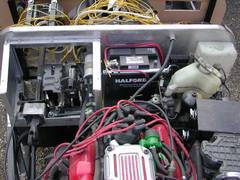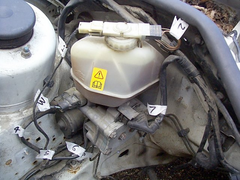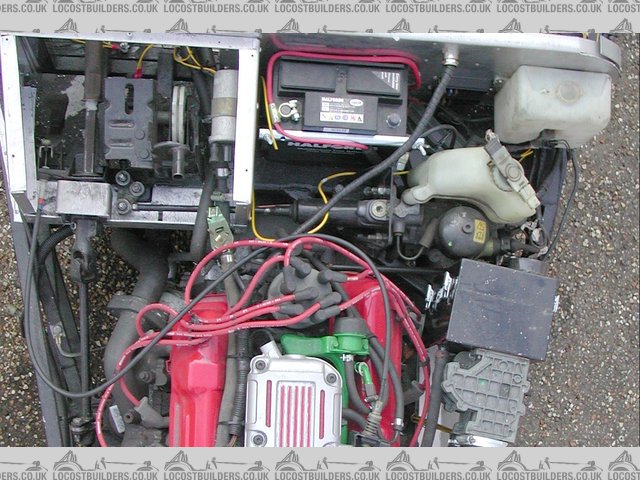
ABS braking system
RallyHarry - 20/12/04 at 02:46 PM
I've done my searches, and ABS gives to many replies with the word "absolutely" so here's my question which may have been asked
before ...
How hard is it to use an ABS brake system.
I haven't sourced the brake system yet, but the rest of my design is from an ABS equiped car.
And what parts do I need except the wheel sensors? where's the electric motor producing the pulsing effect etc ?
Cheers
zetec - 20/12/04 at 05:29 PM
You will need to find a donor which can supply a remote valve block. The Sierra master cylinder from an ABS car is too big. The wheel sensor bit
should be fairly easy to source. I think you will also need to arrange a speed sensor source for the system. I think a couple of people on the forum
have done it. Also the bloke building a 5exi or whatever it is called in one of the kit mags has gone with ABS from a Rover.
phelpsa - 20/12/04 at 05:39 PM
On blatchat, search for posts by PeterT on ABS, as I think he is installing it on his Caterham. He will be willing
to help as he is a very nice man, we bought a set of wheels off him a few months ago.
Adam
smart51 - 26/12/04 at 11:06 AM
An ABS system usually comprises a single ABS unit that houses the motor, pump, valves and ECU. This will be connected by two pipes to the master
cylinder and by one pipe to each wheel. There will be either 3 or 4 wheel speed sensors, depending on the donor car. these are wired to the ECU and
point at a toothed ring mounted to or cast into the wheel hubs. 3 channel systems sometimes have the 3rd sensor in the rear diff.
you will have to be carefull to get all the wiring and sensors or the system will not work.
you also have to be careful when bleeding / refilling an ABS unit as air bubbles can be caught in the internal pipework that can only be got out by
cycling the valves. once disconnected, keep the ABS unit upright so that the internal brake fluid doesn't leak out.
be careful. ABS systems are tuned to suit a particular car. this takes into account the amount of deceleration that the donor can manage before the
wheels lock up. A kit car, being lighter than the donor, may not be as sensitive to wheel lock up. ABS from a heavy donor may start to cut in sooner
than it needs to.
Aloupol - 26/12/04 at 11:46 AM
An ABS street car passes a lot of test hours before production stage, and tuning the system is very hard.
The first ABS cars didn't work because of bat matching between brakes and suspension.
Actualy on cars in the ABS early days the braking distance in normal conditions were longer than without ABS.
I couldn't state if for amateur builders like us it's a good way or not but I would be careful before starting such a special work.
stephen_gusterson - 26/12/04 at 04:47 PM
I am using abs on my car.
its from a 1987 ford granada and is a teves mk1 or 3 (dont remember)!
It may be that abs systems are tuned to particular cars on later, more intelligent models.
I can say however that the teves system from the ford is dead simple.
its just the valve block / master cylinder, the 4 wheel sensors, and the control box.
there are no load sensing devices, or anything else for that matter. The car was a little under 1300 kilos, and could carry approx 500 kilos of
passengers and stuff. On top of that, you could tow a caravan, and the system still wouldnt know the difference. So I recon its fairly safe to say
that the system merely functions by sensing a wheel locking, and then releasing pressure until it revolves.
Its a three circuit system - the rear brakes are connexted together.
the main master cylinder and valve block is a bit big, so i mounted it on the passenger side and made a mechanism to transfer the actuation thro 90
degrees.
It was dead easy to bleed. the fronts bleed normally, and the rears have to have the system powered up and working as the abs pump must run to drive
them. The system seems to be VERY similar to that fitted on my 1989 jag xj-s, in that each time you start the car up, the abs motor runs, and pumps
air pressure into the black ball shaped cylinder. it needs pressure to make the rears work. dont even think of bleeding the rears unless its
pressurised - you wont get any fluid movement!
see pics
atb
steve
[Edited on 26/12/04 by stephen_gusterson]


Rescued attachment abs1.jpg
stephen_gusterson - 26/12/04 at 04:52 PM
and as it was on the donor


Rescued attachment abs3.jpg
stephen_gusterson - 26/12/04 at 04:54 PM
from the top


Rescued attachment abs4.jpg
smart51 - 30/12/04 at 11:03 AM
"it is dead simple - wheel speed sensors, block and ecu."
Yeah, from the outside. It's what's in the ECU that is more complicated. The tuning will be stored in the ECU.
The tuning will make all the difference. if you gofrom a 1300kg front heavy car to a 500kg evemly balanced car then the ABS will probably not work to
the best of it's ability. either it will act too soon (reducing the upper limit of brake force that can be applied) or it will act too late an
the wheels will lock up before the ABS takes effect.
I have worked on ABS systems on 4 wheel rolling roads and they behave quite stangley when they get confused.
I think that ABS on a kit car is a very good thing and would like it myself but I think that you'd have to be lucky to make it work very well.
stephen_gusterson - 30/12/04 at 08:13 PM
my car is likely to weigh in excess of 800 kilos (its not a seven) and thats only about 450 kilos less than the donor - and the donor can weigh that
difference ABOVE that of the unladen car, so im tending to think that its not a major concern.
i will find out one day 
atb
steve
JoelP - 30/12/04 at 08:17 PM
well look on the bright side, if it doesnt work well steve will have contributed to the sum of the forums' knowledge with his reports of failure,
and its a simple job to swap it all out for a non abs system. nice one ste.
nice one ste.








 nice one ste.
nice one ste.